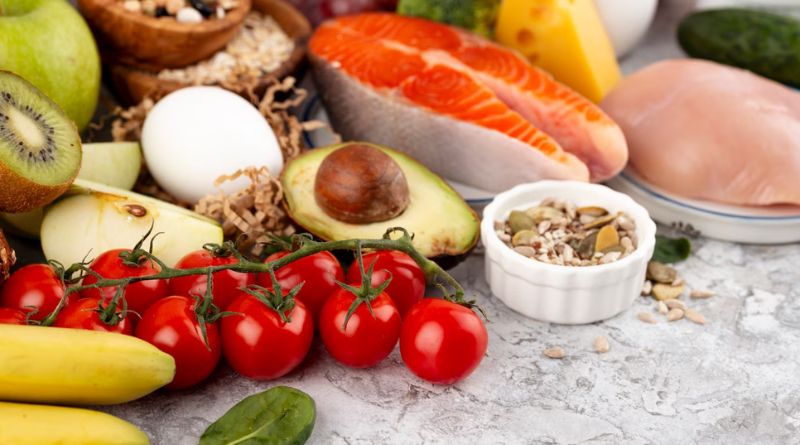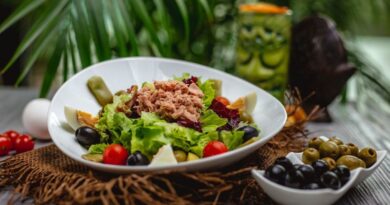Foods High in Collagen – Collagen, a structural protein abundant in the human body, plays a pivotal role in maintaining skin elasticity, joint flexibility, and overall health. Comprising various types, such as Type I in skin and bones, Type II in cartilage, and Type III in muscles, collagen is vital for sustaining our body’s structural integrity.
As we age, collagen production naturally declines, emphasizing the significance of incorporating collagen-rich foods into our diets. This guide explores natural sources of collagen, including bone broth, fish, chicken, beef, and pork, as well as collagen-boosting foods like berries, leafy greens, citrus fruits, nuts, and seeds.
By understanding and incorporating these nutrient-dense options, individuals can proactively support their body’s collagen levels, promoting skin vibrancy, joint health, and overall well-being.
Foods High in Collagen
Bone Broth
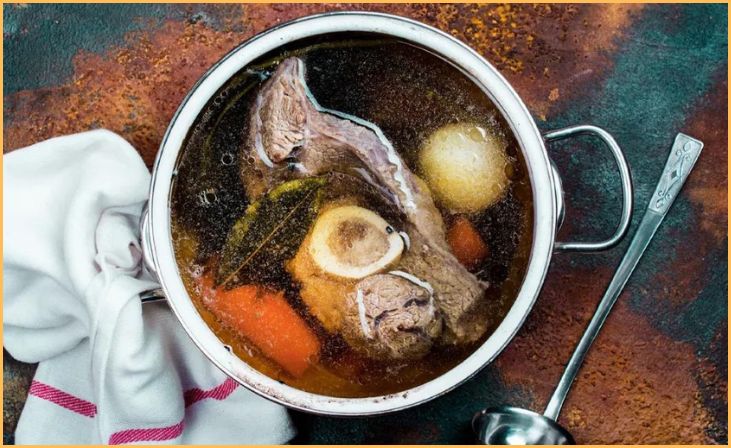
Bone broth is a collagen-rich liquid obtained by simmering animal bones and connective tissues. Packed with essential nutrients, it supports skin, joint, and overall connective tissue health.
Chicken skin and fish, especially with edible skin like salmon, are collagen sources. Eggs contribute by providing proline, a collagen-building amino acid. Berries and leafy greens offer antioxidants, including vitamin C, crucial for collagen synthesis. Citrus fruits like oranges provide additional vitamin C support.
Incorporating these foods into your diet promotes collagen production, contributing to healthier skin, hair, nails, and joints. Additionally, bone broth serves as a nutritious base for soups and stews, making it a versatile and tasty collagen-boosting option.
Also, Read – 10 Essential Superfoods for a Healthy Pregnancy
Chicken Skin
Chicken skin is a collagen-rich part of the poultry that can contribute to skin health. Despite its reputation for being fatty, it contains essential nutrients, including collagen, which is beneficial for maintaining skin elasticity and strength.
When cooked, chicken skin can add a flavorful and crunchy element to dishes, enhancing both texture and taste. While it’s essential to consume it in moderation due to its fat content, incorporating chicken skin into your meals occasionally can be a tasty way to support collagen intake. Remember to pair it with a balanced diet that includes a variety of nutrient-rich foods for overall health and well-being.
Fish
Fish is a valuable source of collagen, a protein crucial for skin and connective tissue health. Varieties like salmon, with edible skin, provide an additional collagen boost. Beyond collagen, fish is rich in omega-3 fatty acids, supporting overall skin health and promoting a glowing complexion.
These fatty acids also contribute to joint health and may reduce inflammation. Incorporating fish into your diet can provide essential nutrients, supporting the body’s natural collagen synthesis.
Grilled, baked, or poached fish is a delicious and versatile addition to meals, offering a tasty way to enhance your skin, hair, and nail health while benefiting from the numerous other nutritional advantages fish has to offer.
Egg Whites
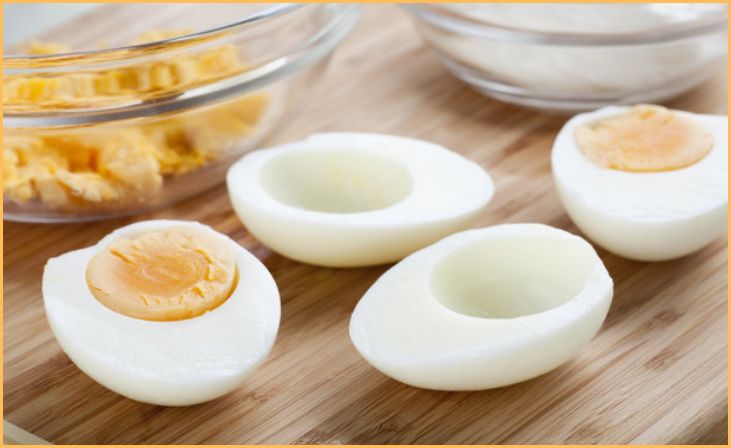
Egg whites are a collagen-supporting powerhouse. While not a direct source of collagen, they contain proline, an amino acid crucial for collagen production. Including egg whites in your diet provides the building blocks necessary for maintaining skin elasticity and joint health.
Proline aids in the synthesis of collagen, contributing to the strength of connective tissues. Whip up egg whites for a protein-packed, low-calorie addition to your meals, promoting muscle growth and skin health.
Whether in omelets, scrambles, or meringues, incorporating egg whites into your culinary repertoire is a simple and versatile way to support collagen formation and overall well-being.
Berries
Berries are vibrant sources of antioxidants, including vitamin C, essential for collagen synthesis. These antioxidants protect the skin from oxidative stress, promoting a healthy and youthful complexion. Vitamin C plays a pivotal role in collagen formation, contributing to skin elasticity.
Blueberries, strawberries, raspberries, and blackberries are not only delicious but also rich in polyphenols that benefit skin health. The anti-inflammatory properties of berries may help alleviate skin conditions.
Easily incorporated into smoothies, yogurt, or enjoyed on their own, these nutrient-packed berries provide a tasty way to support collagen production and overall skin well-being, offering a sweet and colorful boost to your daily diet.
Also, Read – Top 8 Foods to Remove Eye Dark Circles: Nourishing Your Skin from Within
Leafy Greens
Leafy greens, such as spinach, kale, and Swiss chard, are nutritional powerhouses that support collagen production and overall skin health. Packed with vitamins, minerals, and antioxidants, these greens provide essential nutrients, including vitamin C.
This vitamin is crucial for collagen synthesis, promoting skin elasticity and resilience. Additionally, the antioxidants in leafy greens help protect the skin from oxidative stress, reducing the signs of aging.
Incorporating these nutrient-dense greens into your diet through salads, smoothies, or as side dishes can contribute to a radiant complexion and support the body’s natural collagen-building processes, enhancing not only skin health but overall well-being.
Citrus Fruits
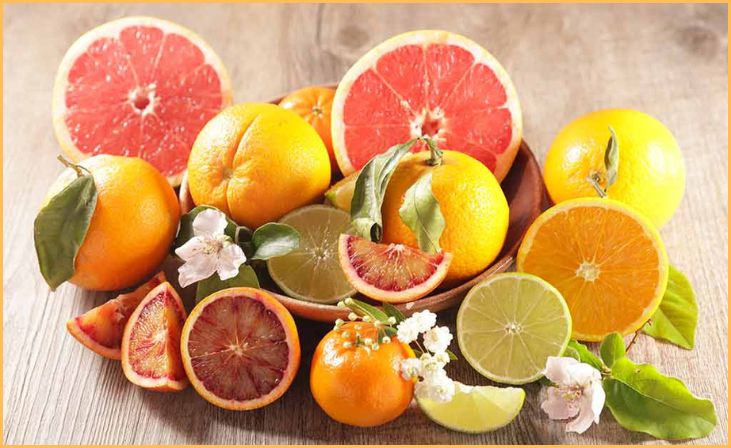
Citrus fruits like oranges, lemons, and grapefruits are rich sources of vitamin C, a key nutrient for collagen synthesis. Vitamin C plays a crucial role in the formation of collagen, a protein essential for skin elasticity and connective tissue health.
These fruits not only provide a tangy burst of flavor but also contribute to a radiant complexion and overall skin vitality. Vitamin C’s antioxidant properties help combat oxidative stress, reducing the impact of environmental factors on the skin.
Whether enjoyed as a refreshing snack, squeezed into beverages, or incorporated into salads, citrus fruits offer a delicious and convenient way to support collagen production and promote skin well-being.
Conclusion
In conclusion, prioritizing collagen-rich foods is a simple yet impactful way to fortify the body’s structural foundation. As collagen diminishes with age, integrating bone broth, fish, poultry, and collagen-boosting fruits and vegetables becomes crucial for skin elasticity and joint health.
By embracing these dietary choices, individuals can foster longevity, resilience, and a holistic approach to well-being. Elevating collagen intake stands as a proactive and accessible means to support our bodies throughout the various stages of life.
FAQs
Collagen is a protein found in the body, providing structural support to skin, joints, bones, and organs. It contributes to skin elasticity, joint flexibility, and overall health.
There are various types of collagen, with Type I found in skin and bones, Type II in cartilage, and Type III in skin, muscles, and blood vessels.
Foods rich in collagen include bone broth, fish (salmon, mackerel), chicken (especially skin and cartilage), beef (oxtail, beef shank), and pork (skin, trotters).

